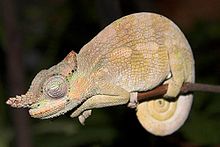Kinyongia
| Kinyongia | |
|---|---|

| |
| Kinyongia tavetana, sleeping | |
| Scientific classification | |
| Domain: | Eukaryota |
| Kingdom: | Animalia |
| Phylum: | Chordata |
| Class: | Reptilia |
| Order: | Squamata |
| Suborder: | Iguania |
| Family: | Chamaeleonidae |
| Genus: | Kinyongia Tilbury, Tolley & Branch, 2006 |
Kinyongia (derived from the group's name in Kiswahili language)[1] is a chameleon genus recently established for several plesiomorphic species found in forest and woodland in Kenya, Tanzania, Uganda, Rwanda, and far eastern DR Congo. All except K. adolfifriderici and K. tavetana are restricted to highlands, and many have very small geographic ranges. In most, at least the males have horns or knobs on their noses. They had been placed into the genus Bradypodion for some time.[2][3] It has recently been pointed out that the ending to the specific epithet in several of the below listed species should be modified to match the feminine genus name.[4]
Species
The following 23 species are recognized as being valid.[5]
- Kinyongia adolfifriderici (Sternfeld, 1912) – Ituri chameleon
- Kinyongia asheorum (Nečas et al., 2009) – Mount Nyiro bearded chameleon
- Kinyongia boehmei (Lutzmann & Nečas, 2002) – Boehme's chameleon
- Kinyongia carpenteri (Parker, 1929) – Carpenter's chameleon
- Kinyongia excubitor (Barbour, 1911) – Mt. Kenya hornless chameleon
- Kinyongia fischeri (Reichenow, 1887) – Fischer's chameleon
- Kinyongia gyrolepis (Greenbaum et al., 2012) – Lendu chameleon
- Kinyongia itombwensis Hughes et al., 2017 – Itombwe forest chameleon
- Kinyongia magomberae Menegon et al., 2009 – Magombera chameleon
- Kinyongia matschiei (F. Werner, 1895) – giant monkey-tailed East Usambara two-horned chameleon
- Kinyongia msuyae Menegon et al., 2015
- Kinyongia multituberculata (Nieden, 1913) – West Usambara two-horned chameleon
- Kinyongia mulyai Tilbury & Tolley, 2015
- Kinyongia oxyrhina (Klaver & W. Böhme, 1988) – sharp-nosed chameleon
- Kinyongia rugegensis Hughes et al., 2017 – Rugege highlands forest chameleon
- Kinyongia tavetana (Steindachner, 1891) – dwarf Fischer's chameleon, dwarf two-horned chameleon
- Kinyongia tenuis (Matschie, 1892) – Usambara soft-horned chameleon
- Kinyongia tolleyae Hughes et al., 2017 – Tolley's forest chameleon
- Kinyongia uluguruensis (Loveridge, 1957) – Uluguru two-horned chameleon
- Kinyongia uthmoelleri (L. Müller, 1938) – Hanang hornless chameleon
- Kinyongia vanheygeni Nečas, 2009 – Van Heygen's chameleon
- Kinyongia vosseleri (Nieden, 1913) – East Usambara two-horned chameleon
- Kinyongia xenorhina (Boulenger, 1901) – strange-nosed chameleon
Nota bene: A binomial authority in parentheses indicates that the species was originally described in a genus other than Kinyongia.
References
- ^ Lutzmann, Nicolà (2008). "Some important changes in the systematics of Bradypodion Fitzinger, 1843". Chameleons! Online E-Zine, February 2008. Retrieved 2012-09-24.
- ^ Klaver CJ, Böhme W (1986). "Phylogeny and classification of the Chamaeleonidae (Sauria) with special reference to hemipenis morphology". Bonner Zoologische Monographien 22: 1–64.
- ^ Tolley, Krystal A.; Tilbury, Colin R.; Branch, William R. (2004). "Phylogenetics of the southern African dwarf chameleons, Bradypodion (Squamata: Chamaeleonidae)". Molecular Phylogenetics and Evolution 30: 354–365. doi:10.1016/S1055-7903(03)00211-2 PDF fulltext Archived 2007-02-02 at the Wayback Machine
- ^ Tolley, Krystal A.; Tilbury, Colin R.; Branch, William R. (2007). "Corrections to species names recently placed in Kinyongia and Nadzikambia (Reptilia: Chamaeleonidae)". Zootaxa 1426: 68.
- ^ "Kinyongia ". The Reptile Database. www.reptile-database.org.
Further reading
- Necas P, Sindaco R, Korený L, Kopečná J, Malonza PK, Modrý D (2009). "Kinyongia asheorum sp. n., a new montane chameleon from the Nyiro Range, northern Kenya (Squamata: Chamaeleonidae)". Zootaxa 2028: 41–50.
- Tilbury CR, Tolley KA, Branch WR (2006). "A review of the genus Bradypodion (Sauria: Chamaeleonidae), with the descriptions of two new genera". Zootaxa 1363: 23–38. (Kinyongia, new genus).
